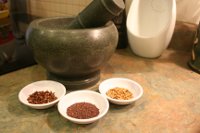 Flipping through my more recent columns, it occurred to me that I’ve been kinda sweet on vegetables and salads and woefully neglecting the needs of my carnivore friends. I feel like a jerk. This column’s looking like it could use some animal protein. And what better time to talk about meat then when BBQ season is in full swing, necessitating purchases like these?
Flipping through my more recent columns, it occurred to me that I’ve been kinda sweet on vegetables and salads and woefully neglecting the needs of my carnivore friends. I feel like a jerk. This column’s looking like it could use some animal protein. And what better time to talk about meat then when BBQ season is in full swing, necessitating purchases like these?
People are often superstitious about their approach to flavouring meat for the grill: keep it simple for good cuts of meat (salt, pepper and olive oil for a quality ribeye); use a longer marinade time for tougher cuts like short ribs used for Korean-style Galbi, or jerk chicken. Still others insist on basting religiously with sauces before, during or after grilling.
Often overlooked, however, are the dry rubs, which are the quickest and easiest means of flavouring your meat. Dry rubs are incredibly versatile and lend themselves well to tinkering — after experimenting for a while, most people will eventually find some secret balance of spicy, savoury and sweet that suits them best (and personalized jars of spice rub make great gifts!).
When we bought our first barbecue, my dad gave me a copy of Jamie Purviance’s Weber’s Real Grilling, a veritable BBQ bible that I recommend without reservations, particularly for the novice griller. Purviance breaks down a number of potential rub ingredients into six complementary categories: Hot (cayenne, chilis) vs. Sweet (brown sugar, cinnamon, allspice); Earthy (cumin, paprika, coriander) vs. Herbaceous (dried herbs like thyme or oregano); and Sharp (garlic powder, granulated onion, mustard seeds) vs. Salty (kosher or sea salt). The best rubs usually balance at least three or four of these elements against each other to provide a more complex flavour.
A few tips on making rubs: grinding your own spices makes a huge difference in flavour, especially since ground spices will lose their aroma in eight to 10 months. Invest in a good mortar and pestle or spice grinder and purchase your spices whole when you can. Store spices in airtight containers in a dark, cool space. Toasting your spices lightly before crushing them will also enhance the flavour. You can pre-crush a large portion of spice rub and store it as well, just be sure to use it up within six months or so (labeling the jar with the date is an anal-retentive strategy that I encourage).
As for length of time, it’s all about balance; you want the rub to intermingle with the juices from the meat to create a crust when cooking, but sugary or salty rubs will also draw moisture out of the meat if left too long. Most cuts of meat like steaks or chicken breasts will only need 15-20 minutes for the rub to set before you can put it on the grill. Smaller cuts (shish kebabs, shellfish, etc.) will need less time, and bone-in or larger cuts can handle a longer rub time, even up to a couple hours. Big cuts like pork shoulders or ribs can have a rub put on two to eight hours before grilling.
Below, I’ve included a few favourites, but I encourage you to use these as a base and mess about to find your own personal touch. With any rub, lightly oil the meat or fish prior to applying. Using your hands, sprinkle each surface evenly and rub in gently to distribute.
Five-Spice Rub
Great on pork (chops, tenderloin) and chicken (breasts, thighs, legs)
1 tbsp brown sugar
1 tbsp Five-Spice powder
1 tsp granulated garlic
1 tsp kosher salt
1/2 tsp ground ginger
1/4 tsp cayenne pepper
Fajita Rub
Recommended for Tex-Mex -inspired beef (flank or skirt) or chicken (thighs or breasts)
1 tbsp chili powder
2 tsp crushed dried chiles (if you can find Ancho or Arbol chilies and crush those, do it!)
1 tbsp ground cumin
1 tbsp ground coriander
1 tsp dried oregano
2 tsp granulated garlic
2 tsp granulated onion
2 tsp kosher salt
Jerk Rub
A great alternative if you don’t have time for marinade — would be great on pork tenderloin or chicken breasts/thighs/legs
1 tbsp brown sugar
2 tsp granulated garlic
2 tsp granulated onion
2 tsp kosher salt
2 tsp dried thyme
½ tsp ground allspice
½ tsp ground cinnamon
¼ tsp cayenne pepper
1 tsp fresh ground pepper
Sara Chan is a newly called Toronto lawyer. Her favourite food group is pork. Sara’s column appears every other Tuesday here on lawandstyle.ca.

